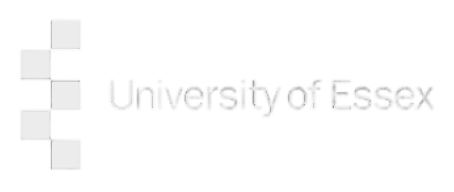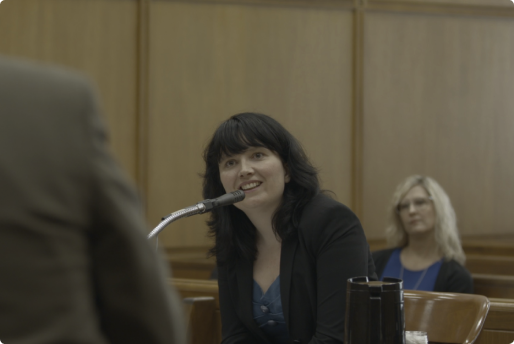ABOUT
EMMA L. BRIANT

Emma L. Briant is a British scholar and academic researcher on media, contemporary propaganda, surveillance and information warfare who was involved in exposing the Facebook–Cambridge Analytica data scandal. She is a Visiting Associate Professor at the Lucy Family Institute for Data and Society, at University of Notre Dame in the United States.
Biography
In 2024, Dr. Briant was interviewed on ‘Disinformation Wars’ for the Georgetown Journal of International Affairs. She authored a number of opinion articles on algorithms and Big Tech, and Russian propaganda, and completed work on what she hopes will be a discipline-shaping new book. Co-edited with Prof. Vian Bakir from Bangor University in the UK, the Routledge Handbook on the Influence Industry is available to order on Routledge website in your region. The book takes aim at the institutions and industries behind the disinformation crisis and its aim is to refocus the scholarly field around these structural causes.
It provides the first comprehensive examination of the influence industry and how it operates worldwide across different domains. The volume fills a gap in scholarship exploring the recent technical, political and economic development of the influence industry, surveying the extent of different technologies and services offered to clients worldwide across multiple domains (commercial, political, national security and government). The chapters are divided into three thematic sections, and evaluate Influence Industry practices, aims and effectiveness across audiences; business practices and economics; and democratic structures and human rights. They also offer advice for researchers and consider key ethical issues and new regulatory approaches. This volume will be of much interest to students of political science, surveillance studies, propaganda studies, sociology, communication studies and journalism.
See below for a list of recommendations it has received so far from top scholars in the field.
“This essential and comprehensive volume brings together an impressive range of scholars from across the world to shine a light into one of the most important – but misunderstood – issues of our time.” Rory Cormac, University of Nottingham, UK
“At a time when too much scholarly attention is given to the notion that disinformation is but an artifact of algorithms and social media’s commercial logic, Emma L. Briant and Vian Bakir remind us of the role of institutionalized political power, what they call in this important volume the influence industry. Powerful industry actors take advantage of technology to shape public perceptions and even behaviors in a struggle for dominance and control. This insightful book is a must-read for those interested in understanding modern digital politics.” Steven Livingston, George Washington University, USA
“This invaluable collection gives a sharply-focused analysis of what the as yet under-researched influence industry is. Even more important, it reveals what the industry does – shaping how people think and guiding how they act – through a series of impressive case studies that show how data-driven influence campaigns and practices operate worldwide across commerce, politics and national security. Innovative conceptually, it proposes a new, better way to understand and study propaganda and disinformation. And it offers constructive, practical proposals for countering their effects.” Steven Lukes, New York University, USA
“The Routledge Handbook of the Influence Industry is one of the most important contributions in our field in recent times. The editors have done a remarkable job in bringing together a series of works that have effectively open a new space for reflection and discussion. I have no doubt that it will quickly become a seminal piece that will be quoted and used as a reference by scholars and experts to understand the perversity and the extent of manipulation of the public that have led to disasters such as Brexit and the 2016 election of Donald Trump.” Jairo Lugo-Ocando, University of Sharjah, UAE.
SCHOLARLY PUBLICATIONS
Briant, E, L & Bakir, V (In Press 2024) Routledge Handbook on the Influence Industry, London: Routledge.
Briant, E, L (2024) “Challenging Words”. Index on Censorship, 54(1).
Briant, E, L (2024) “Researching Influence Operations: ‘Dark Arts’ Mercenaries and the Digital Influence Industry” in Bjola, Corneliu & Manor, Ilan. Oxford Handbook of Digital Diplomacy. Oxford: Oxford University Press, 80-99.
OPINION ARTICLES
Briant, E (2024) Reader reply: I’ve experienced state-backed hacks. Assange’s ‘journalism’ is dangerous. Crikey.
Briant, E and Chalupa, A (2024) Tucker Carlson Takes Putin’s Propaganda on Tour Down Under – Why Should Australians be Concerned? Australian Institute of International Affairs/Australian Outlook.
Briant, E (2024) In Fighting the “Disinformation” Problem, We Risk Losing the Battle for Our Minds to Big Tech. Australian Institute of International Affairs/Australian Outlook.
In June 2023, Dr. Briant moved to Melbourne, Australia to take up a new position as Associate Professor of News and Political Communication, at Monash University in the School of Media, Film and Journalism. Her teaching at Monash included coordinating the unit ‘News and Power,’ and teaching on the course ‘Fundamentals of Journalism’. In the 2023 Student Evaluation survey her teaching quality was rated as ‘High.’ Her service in the position included a short stint as Acting Head of Journalism and she became a member of the Equity Diversity and Inclusion Research Network. She made contributions to several reports into Australian technology policy with the foundation Reset Australia. As cyberattacks and leaks became increasingly prominent as fodder for propaganda and harassment, Dr. Briant’s research interests explored the implications of these for freedom of expression in a new book chapter ‘Hack Attacks’ and several opinion articles. Dr. Briant was an invited speaker at Cambridge Disinformation Summit, held at Kings College, University of Cambridge. She also gave an online talk on disinformation at the Kyiv School of Economics in Ukraine.
SCHOLARLY PUBLICATIONS
Briant, E, L (2023) “Hack Attacks: How Cyber Intimidation and Conspiracy Theories Drive the Spiral of ‘Secrecy Hacking’” in Steel, J and Petley, J. Routledge Companion To Freedom of Expression and Censorship, London: Routledge.
OPINION ARTICLES
Briant, E (2023) Hacking is far more than a security issue. It chills free speech. Index on Censorship.
Briant, E (2023) The Air Force Loves War Gamers Like Teixeira. SpyTalk.
Briant, E (2023) How Social Media Incentives Helped Drive the Discord Leaks. Tech Policy Press.
In 2022 Dr. Briant became an Associate at the University of Cambridge’s Judge Business School in the Centre for Financial Reporting & Accountability, where she collaborates on projects concerning the political economy of disinformation and propaganda. She also became a Fellow at Central European University’s Center for Media, Data and Society.
She authored a number of articles on social media, psychological operations and their ethical use in democracies, and gave numerous invited talks including a Keynote at Central European University in Vienna and invited testimony at the European Parliament, Brussels on ‘Transparency and Targeting of Political Advertising,’ November 2022. After Russia invaded Ukraine and the information war grew dirty, much of her work began taking a critical look at what Western militaries were doing in the information war with Russia, as she observed unethical tactics that could easily backfire.
OPINION ARTICLES
Briant, E L (2022) “Pentagon PSYOP Scandal Demands an Urgent Debate on Propaganda Ethics’ Tech Policy Press.
Briant, E L (2022) “How a new US Army video recruiting for deception risks fueling conspiracy theories’ in Medium”
Briant, E L (2022) “How Russia benefits from ill-informed social media policies” in Brookings, TechTank.
The major media coverage and policy debate prompted by Dr Briant’s research and reporting in OCCRP and the Ottawa Citizen and David Pugliese’s 2020 reporting for the Ottawa Citizen led to several investigations by Canada’s Department of National Defense into information activities by the military and the evolving policies for public affairs. The military’s activities were shown to have broken their own rules and a policy review was launched.
Dr Briant’s concerns about the lack of strong research into the actors behind influence operations led her to launch a larger project, inspired by her mapping of Cambridge Analytica’s campaigns at propagandamachine.tech called ‘Project Illuminate’ – putting together a growing database of over 1000 influence industry firms for analysis.
She wrote another impactful article in Wired critiquing the methodologies used to research by Oxford University researchers for a report that was proving influential and she warned of the danger of misleading reports based on her opinion as these unsafe methods were being depended on by policymakers.
This led to her being invited to speak on ‘Disinformation for Hire’ at the Atlantic Council’s DFR Lab ‘360/Open Summit: The World in Motion’
Dr. Briant commenced work as Adjunct Professor at American University, Washington, D.C., US and started her new company Maven of Persuasion LLC. As she is invested in the knowledge exchange between academia and industry / policy stakeholders, and believes academics have a role in guiding positive, ethical outcomes for governments, she has developed and delivered highly successful executive education courses and workshops to that end, encompassing: counter-extremism, ethics and information operations, disinformation and international security.
Dr. Briant also launched a new YouTube show called ‘Afternoon Tea and Truth Biscuits’. This is the first episode Afternoon Tea & Truth Biscuits: Dr Emma Briant and Heidi Cuda.
OPINION ARTICLES
Briant, E L (2021) ‘Briant: Canadian military’s bungled propaganda campaigns should be a lesson across NATO’ in Ottawa Citizen.
Briant, E L (2021) ‘The Grim Consequences of a Misleading Study on Disinformation’ in Wired.
Dr. Briant co-authored a new peer reviewed article in Politics with Dr. Dmitry Chernobrov based on their discourse analysis of Russian and US public diplomacy.
Dr Briant launched another major project in 2020 – The Interactive Cambridge Analytica Map – the tool collates and analyzes reporting of the scandal-ridden company Strategic Communication Laboratories (SCL) and their subsidiary Cambridge Analytica (CA), whose wrongdoing she was central in exposing in the 2018 Facebook scandal. On the website Dr. Briant mapped reported global reach of the connected firms (1989-2018), including clients and projects, building a map that visualizes the expanding scale and spread of their activities over time. It allows you to move back and forward in time exploring projects. Explore the map on the Propaganda Machine project website, linked above. (Best explored on desktop not mobile).
Dr. Briant also authored an article for Brookings looking at why efforts to tackle ‘disinformation’ weren’t working and calling for more research and policy efforts focused on the actors involved in influence campaigns. It argued for more work mapping the influence industry:
“Illuminating the influence industry involves not just mapping tweets or Facebook posts, but revealing the powerful networks of companies and clients that stretch around the world, patterns of data use and technologies, funding streams, clients, and strategies—and communicating complex data for policymakers and publics in accessible ways that reveal how we respond”.
In explosive reporting Dr Briant revealed the coverup in the relationship between the major news outlet the Financial Times and Cambridge Analytica. Dr Briant produced several major articles revealing the role of a company set up by former staff of the Cambridge Analytica parent firm to continue work for governments in Canada and The Netherlands and examined the ethical questions raised by rapid changes in military propaganda. This was widely reported in Canada and accompanied by further investigations by David Pugliese in the Ottawa Citizen.
Dr Briant contributed as researcher to the Amazon Prime distributed film People You May Know 2020 which examined data harvesting by Christian conservatives within churches, and the data driving political campaigns in the US.
DOCUMENTARY FILM
SCHOLARLY PUBLICATIONS
Chernobrov, D & Briant, E L (December 2020) ‘Competing Propagandas: How Russia and the US represent mutual propaganda activities’ in Politics, 393-409 doi:10.1177/0263395720966171.
OPINION ARTICLES
Briant, E, L (2020) We need tougher action against disinformation and propaganda, in Brookings Tech Tank Blog.
Briant, E L (2020) ‘DARK IRONIES: The Financial Times and Cambridge Analytica‘ in Byline Times.
Briant, E L (2020) ‘ OPINION: Government Efforts to Counter Propaganda Risk Undermining Public Trust’ in Ottawa Citizen.
Briant, E L (2020) ‘OPINION: Governments Have Failed to Learn from the Cambridge Analytica Scandal’, in OCCRP/Organized Crime and Corruption Reporting Project.
Dr Briant commenced working as a Research Associate at Bard College, NY, US in the Human Rights Program. She worked on The Great Hack, the documentary film that drew on her academic expertise and research and helped expose the Facebook and Cambridge Analytica scandal about data misuse in the 2016 US Election on which she was Senior Researcher. It was later shortlisted for an Academy Award. She published some of her research on Cambridge Analytica’s role in the far right campaign during the Brexit referendum as a new book chapter ‘LeaveEU: Dark Money, Dark Ads and Data Crimes’.
Read more
DOCUMENTARY FILM
SCHOLARLY PUBLICATIONS
Briant, E L (2019) ‘LeaveEU: Dark Money, Dark Ads and Data Crimes’, in Baines, P; Snow, N & O’Shaughnessy, N. SAGE Handbook of Propaganda, London: Sage
OPINION ARTICLE
Briant, E L (2019) ‘Oxford University can’t hide its role in the Cambridge Analytica scandal’ in Open Democracy & (originally) Medium.
While she was a Senior Lecturer at University of Essex, in 2018, Dr Briant published a new scholarly article on the US military’s evolving Psychological Operations policies. Dr. Briant’s research on propaganda also culminated in her submissions to multiple international inquiries revealing the role of Cambridge Analytica in unethical data operations including the 2016 British Brexit Referendum, election of Donald Trump and other campaigns around the world. Dr Briant was centrally involved in revealing a global disinformation and data scandal involving Facebook, the campaign firm Cambridge Analytica that worked for Donald Trump and on the Brexit campaigns, and its defense contractor parent firm SCL Group. Dr Briant’s evidence aided among others the UK Parliament, US Congress, European Parliament, Canadian Parliament with major investigations into foreign influence, disinformation and data misuse. It was accompanied by a huge wave of worldwide reporting along with her own opinion articles, see below.
SCHOLARLY PUBLICATIONS
Briant, E L (March 2018) ‘Pentagon Ju-Jitsu – reshaping the field of propaganda’ in Critical Sociology Volume: 45 issue: 3, page(s): 361-378
UK PARLIAMENTARY EVIDENCE AND TESTIMONY
Briant, E L (2018) ‘Evidence for the US Senate Judiciary Committee on Cambridge Analytica and SCL Group’, published by US Senate Judiciary Committee, discussed at hearing on: Cambridge Analytica and the Future of Data Privacy’.
Briant, E L (2018) ‘Further Supplementary written evidence on Cambridge Analytica, Leave.EU and Eldon Insurance’, published by Digital, Culture, Media and Sport Select Committee Inquiry into Fake News: UK Parliament.
Briant, E L (2018) ‘Building a stronger and more secure democracy in a digital age’ A Response to Recent Interim Reports and Proposals, published by Digital, Culture, Media and Sport Select Committee Inquiry into Fake News: UK Parliament.
Briant, E L (2018) ‘Evidence on Leave.EU, Eldon Insurance and US Health Insurance Industry’ in Supplementary written evidence submitted by Dr Emma L Briant, Senior Lecturer at University of Essex published by Digital, Culture, Media and Sport Committee Inquiry into Fake News: UK Parliament.
Briant, E L (2018) ‘Three Explanatory Essays Giving Context and Analysis to Submitted Evidence’ in Research on Leave EU.
Dr Briant’s policy proposals were endorsed in the Final Report of the UK Parliament’s Select Committee on Digital, Culture, Media and Sport, ‘Inquiry into Disinformation and Fake News’.
OPINION ARTICLES
Briant, E L (2018) ‘Comment is Free: I’ve seen inside the digital propaganda machine. It’s dark in there.’ in The Guardian.
Briant, E L (2018) ‘Amid shocking revelations about Cambridge Analytica unethical activities, SCL Group’s defence work needs real scrutiny’ in Open Democracy.
Briant, E, L (2018) ‘Our governments share responsibility for the Cambridge Analytica crisis… and here’s how they should fix it‘ in Open Democracy.
Dr Briant organized a workshop to advance new methods for addressing propaganda research which was increasingly concerning as an issue: ‘Hidden Power: Innovative Methods for Researching Power in a Post-Snowden Era’ (Sheffield Methods Institute, Journalism Studies/Politics funded workshop) organized with Dr Lisa Stampnitzky.
Dr Briant took a sabbatical and moved to the United States where she began research and writing for joint research project ‘What’s wrong with the Democrats?’ with Prof Robert Entman at George Washington University. She also published several journalistic articles on the UK Brexit Referendum, US Election of President Donald Trump and ‘fake news.’ In 2017 she promoted to Senior Lecturer (Associate Professor) and appointed at Journalism in LiFTS, University of Essex, UK.
OPINION ARTICLES
Briant, E L (2016) ‘Perspectives: The Post-Truth Factor’ in United Nations Association Magazine.
Briant, E L (2016) ‘Beacons of Hope and Hate from the US Election: People Power’s Capacity to ‘Trump’ Injustice’ in The Sociological Review.
Briant, E, L (2016) ‘Failure of British Reporting Refugees to Europe’ in United Nations Association Magazine
While Lecturer in Journalism Studies at University of Sheffield, Dr Briant published her second book, based on her doctoral thesis, ‘Propaganda and Counter-Terrorism: Strategies for Global Change.‘ She continues to publish both on propaganda, ethics of data use and surveillance in the context of political campaigns, international security and conflicts.
Dr Briant was invited to New York University, as a Visiting Scholar in February 2015. She visited Prof. Terence Moran in the Department of Media, Culture & Communication and Prof. Steven Lukes in the Department of Sociology – She delivered guest lectures on ‘Propaganda and Religion’,
‘Propaganda since 9/11’, ‘American Exceptionalism’ and worked on her research/publications on Counter-Terrorism propaganda.
opinion article in The Conversation
Emma L Briant, Nick Watson and Greg Philo (September 2013) ‘Reporting Disability in the Age of Austerity: the changing face of media representation of disability and disabled people in the United Kingdom and the creation of new folk devils‘ in Disability and Society, Vol 28, No 6.
REPORT FOR US DEPARTMENT OF STATE
Dr. Briant was requested to submit a report based on her new book to the US State Department Director of the Advisory Commission on Public Diplomacy. Read the report here “Brief Summary Report on Recent US Information Operations and Public Diplomacy Efforts in Countering Terrorism for the Director of the US Advisory Commission on Public Diplomacy”
SCHOLARLY PUBLICATIONS
Briant, E L (April 2015) ‘Allies and Audiences: Evolving strategies in Defense and Intelligence Propaganda’ in International Journal of Press/Politics (Special Issue), Vol. 20, No. 2.
Briant, E, L (2015) Propaganda and Counter-terrorism: Strategies for Global Change. Manchester University Press
Dr Briant’s publications ‘Reporting Disability in the Age of Austerity…’ and ‘Bad News for Disabled People’ – the report on which it was based – were submitted as examples of research excellence to the Research Evaluation Framework in 2014 by University of Glasgow as a case study showing how the university’s research was making a massive societal impact.
This research, on which Dr Briant was first author and guided a team of research assistants, helped Glasgow University achieve Rank of 1st in Scotland and 8th in the UK in sociology for its impactful research, by the time she moved on to her first faculty post as Lecturer (Assistant Professor) at University of Sheffield that year. It had already had a huge impact for media policy in Britain and highlighted how marginalized the experiences of people with disabilities were in British media and political debates.
An extract from the nationwide Research Evaluation entry detailing the policy impact Dr. Briant and her colleagues had, and promoting it as an example of excellence at Glasgow University said that: “This research ignited the political debate on media representations of disabled people”.
For example, on 14 November 2011, the report was directly cited by Dame Tanni Grey-Thompson in a welfare reform debate in the House of Lords as evidence of widespread misrepresentation of disabled people and disability benefits.
Also in November 2011, the Shadow Minister for Disability Issues referred directly to the University of Glasgow findings in a House of Commons debate on disability hate crime. The report was also mentioned during discussion in the Work and Pensions Select Committee (February 2012), allowing the National Autistic Society and Disability Alliance to draw attention to ‘the negative tone adopted in the media about wider disability issues’. The Parliamentary Select Committee Chair also used the research in the in the Committee’s questioning of Department for Work and Pensions Ministers concerning the changing attitudes to disabled people and the transformation of the language used to represent disabled people and disability benefits in the media. The research was cited in the Work and Pensions Select Committee’s report Government support towards the extra living costs of working age disabled people and in a Westminster Briefing prepared by The Parliamentary Office of Science and Technology on Work Capacity Assessment. The Committee Chair has also drawn from the research in the preparation of speeches and articles relating to the change of language used to describe disabled people since the 2010 General Election.
Dr Briant’s groundbreaking and impactful research on media coverage of disability formed the basis for a widely cited article on which she was first author, with Greg Philo and Nick Watson: Greg Philo, Emma Briant, Pauline Donald, Bad News for Refugees (Pluto Press, 2013)
Dr Briant’s first book Bad News for Refugees, (Pluto Press, 2013, co-authored with Greg Philo and Pauline Donald) examined UK political and media discourse on migration prior to ‘Brexit’ as well as its impact on communities.
It involved collaboration with the Red Cross and Refugee Council, demonstrating the negative impact of misleading coverage of the refugee crisis on communities and migrants’ mental health.
The book made real-world changes when Dr Briant and her co-authors contributed evidence with Scottish Refugee Council to the Home Affairs Parliamentary Select Committee Inquiry into Asylum & UK Media, which led to new UK rules on journalism ethics in 2013.
Brief spell as a Researcher in Children and Families for the Scottish Government
wrote and published my first journalistic opinion article: Briant, E L (2013) ‘The UK Media needs to stop referring to refugees as ‘illegal immigrants” in New Statesman.
Commenced first faculty position as Lecturer in Journalism Studies at University of Sheffield
Her most-cited academic article published:
Emma L Briant, Nick Watson and Greg Philo (September 2013) ‘Reporting Disability in the Age of Austerity: the changing face of media representation of disability and disabled people in the United Kingdom and the creation of new folk devils‘ in Disability and Society, Vol 28, No 6.
2003
Achieved BA International Relations & Politics Coventry University, UK, 2:1 with Honours including a First Class dissertation examining women’s political activism in eastern Africa.
2004
Obtained MRes (Business and Public Management Research) Glasgow Caledonian University, UK funded by Departmental Scholarship.
2004-2013
Was a productive period living in Scotland for study and work. Dr Briant’s employers included, among others, University of Glasgow’s renowned Glasgow Media Group where she delivered teaching, began writing grant proposals and supervised research.
2007
Obtained MSc Sociology University of Glasgow, UK, with Distinction funded by the UK’s Economic and Social Research Council, Dr. Briant undertook the US based fieldwork for her PhD interviewing experts and practitioners aiding the US Government in information operations. She was based at the American Political Science Association offices in Washington, DC as a Visiting Fellow.Her dissertation examined media management by the UK military during the war in Afghanistan. She was invited to speak about the research at NATO’s Center for Excellence Defence Against Terrorism in Ankara, and she published a chapter, “The struggle for public opinion within the media and information war on terror” in “NATO Teaching Series: Media a Terrorist’s Battlefield.
2009
Based at American Political Science Association, Visiting Fellow, Washington: DC, USA while conducting fieldwork for my PhD.
2011
Dr Briant completed her PhD in Sociology University of Glasgow, UK – ESRC scholarship funded: ‘Special Relationships’ and the Negotiation of the Propaganda ‘War on Terror’ PhD Supervisors: Prof. Greg Philo (Sociology) & Prof. Sarah Oates (Politics). She began working as a research associate for Glasgow University Media Group on the project ‘Bad News for Disabled People’, a major study of media coverage of people with disabilities during a time of UK austerity cuts for which she led a team conducting extensive content analysis. Dr Briant researched and was lead writer on the resulting report and article with Greg Philo and Nick Watson. See: ‘Bad News for Disabled People’ (Inclusion London, 2011).
RESEARCH

Propaganda, Information Warfare and International Security

Media Bias, Disinformation, Inequality and Human Rights

Political campaigns, Platforms, Data and Changing Technology
Propaganda, Information Warfare and International Security
Dr Briant is a prolific scholar regularly publishing respected academic studies, policy reports and op-eds on military propaganda, surveillance and information warfare in the context of human rights and international security.
Dr Briant’s internationally recognized work explores areas such as: emergent strategies in information operations; election interference; surveillance and data misuse; deception operations; private intelligence industry involvement in political disinformation; and regulation of actors involved in influence operations.
She has a particular interest in ethics in warfare and the implications of new technologies for democracies. Her research and expertise on influence operations, international security and data misuse have been sought by US Congress, British, Canadian and European Parliaments and several democratic governments. She is an advocate of transparent governance, ethical conduct and limits on government surveillance and influence operations by democracies and Dr Briant’s work continues to influence policy debates (including for NGOs, social media organizations and NATO) and shape reforms and strategies. Her expertise on complex challenges in this area leads to regular media interviews including the New York Times, Washington Post, Times of London, BBC and many more.

Media Bias, Disinformation, Inequality and Human Rights
A secondary thread of Dr Briant’s research and publications explores how media debates differentially advance or marginalize particular groups, and how inequalities are sustained, reproduced and potentially mitigated through media’s role in society and deliberate campaigns.
Her major works include a widely cited and reported study ‘Bad News for Disabled People’ on which she was first author (with Nicholas Watson and Greg Philo). The study provided significant evidence in the UK Parliament’s Leveson Inquiry into the British Press in 2011 and revealed how people with disabilities were demonized in the press to enable austerity cuts to their welfare benefits. She also co-authored a widely cited book ‘Bad News for Refugees’ (2013) with Greg Philo and Pauline Donald which was a groundbreaking analysis of reporting leading up to the European refugee crisis and Brexit. Dr Briant’s recent publications in this area include world-leading research examining how concerns about migration, Islamophobia and racism were elevated in online campaigns involving dark money and data misuse for Britain’s EU Referendum. Her research contributed to multiple public inquiries in 2018 and was extensively reported worldwide.

Political campaigns, Platforms, Data and Changing Technology
Dr Briant is a leading expert on propaganda who played a key role in one of the most disruptive political research projects of recent years through her work on new technologies, infrastructure and the industry behind misleading influence campaigns.
Dr Briant’s research and expertise on the dark industry of firms profiting off lucrative influence operations and data misuse was central in revealing the Facebook – Cambridge Analytica scandal in 2018. As a consequence, her testimony and expertise on this, and influence operations and data misuse more generally, have been sought by US Congress, British, Canadian and European Parliaments. Dr Briant is now Project Director of ‘Project Illuminate: Scrutiny and Accountability for the Actors Behind Influence Operations’ – researching a dark industry’s global clients, services, data and opacity practices, privacy compliance, and human rights record. She has years of experience writing and speaking on subjects like Big Tech governance; strategic leaks, hacks and cyberattacks; s.230 and Internet reform; ethics and data in information operations; ‘dark PR’ and disinformation; mass surveillance; neurotargeting and radicalization; counter-terrorism; mass surveillance and computational propaganda and their implications for our rights. She acted as researcher on two major films on data misuse and privacy rights in two years – The Great Hack, 2019 (Oscar shortlisted Netflix film about Cambridge Analytica), and People You May Know, 2020 (Emmy-nominated film on data misuse in US politics). Dr Briant’s unique experience and reputation as a recognizable public expert in manipulative and surveillant technologies in global conflicts and elections means she’s sought to provide policy insights and expertise by Big Tech companies, advocacy groups, government agencies and policymakers in the US as well as other western democracies.

FACULTY
POSITIONS
2013-2017
Lecturer (Assistant Professor) in Journalism Studies

2017-2019
Senior Lecturer (Associate Professor) in Journalism

2019-ONGOING
Associate Researcher in Human Rights Program
GRANTS AND AWARDS

2004,2007,2011
2 Masters degrees and PhD were funded by studentships including a 1+3 award from the Economics and Social Research Council (ESRC)
2014
£30,000, with Vian Bakir Primary Investigator (PI) from the Economics and Social research Council for a networking and conference series grant
2014-2015
Gained university funding for 2 research assistants and a methods workshop ‘Hidden Power: Innovative Methods for Researching Power in a Post-Snowden Era’ (31st May 2016)
2016-2017
£10,660 as CI, with Dr Alexandra Hall PI from the White Rose Collaboration Fund for ‘EUROPE, MIGRATION AND THE NEW POLITICS OF (IN)SECURITY’
2016-2017
Secured a prestigious Post-Doctoral Scientist opportunity to work with Robert M Entman.
2019
Awarded a $50k Fellowship by the Institute for New Economic Thinking in New York City
2020
Awarded a $25k Fellowship by the Institute for New Economic Thinking in New York City
2020
Awarded a $25k Fellowship by the Open Society Foundation







